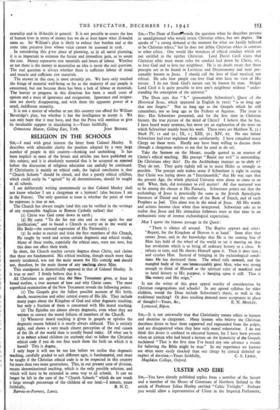RELIGION IN THE SCHOOLS sm,—T read with great interest the
letter from Colonel Mozley. It describes with admirable clarity the .position adopted by a very large number of people in this country—thinking and unthinking. It has been implicit in most of the letters and articles you have published on this subject, and it is absolutely essential that it be accepted or rejected before the discussion of religious education can usefully be continued. If Christianity is mainly an ethical code, the logical conclusion is that "Church Schools" should be closed, and that a purely ethical syllabus, which could easily be "agreed" by all denominations, should be taught in all schools.
I am deliberately writing anonymously so that Colonel Mozley shall not know whether I am a clergyman or a layman! (also because I am in the Forces). The only question at issue is whether the point of view he expresses is true or not.
The Church has always taught (and this can be verified in the writings of any responsible Anglican or Roman Catholic author) that • - (t) Christ was God come down to earth ; (2) He came "To die for our sins and to rise again for our justification," and to found a Church to carry on in the world as His Body—the outward expression of His Personality ; (3) In order to recruit and train the first members of this Church, He taught by word and action certain dogmatic and ethical truths. Many of these truths, especially the ethical ones, were not new, but this does not affect their truth.
In short, the Church teaches certain dogmas about Christ, and claims that these are fundamental. His ethical teaching, though much more than merely incidental, was not the main reason for His comilfg and should not, therefore, be the main theme of any teaching about Him.
This standpoint is diametrically opposed to that of Colonel Mozley. Is it true or not? I firmly believe that it is.
All Christians are agreed that the New Testament gives, at least in broad outline, a true account of how and why Christ came. The most superficial examination of the New Testament reveals the following points: (r) The Gospels give the fullest possible account of His birth, death, resurrection and other central events of His life. They include many pages about the Kingdom of God and other dogmatic teaching, but only a fraction of them is concerned with His moral teaching.
(2) The Epistles are almost always dogmatic, even when they are written to correct the moral failures of members of the Churcit.
(3) Whenever moral teaching is given in gospels or epistles the dogmatic reason behind it is nearly always adduced. This is entirely right, and shows a very much clearer perception of the real causes of the ills of the world than is usually found today. Of what use is it to exhort school children (or anybody else) to follow the Christian ethical code if you do not first teach them the faith on which it is based? This is dogma. - I only hope it will not be too late before we realise that dogmatic teaching, carefully graded to suit different ages, is fundamental, and must be taught if the Christian ethical code is to be respected in this country for more than two more generations. This, in our present state of division, means denominational teaching, which is the only possible solution, and which will have to be extended in some way to all schools. It can no longer be left in the care of the "Church Schools" which do not touch a large enough percentage of the children of our land.—I remain, yours


























 Previous page
Previous page